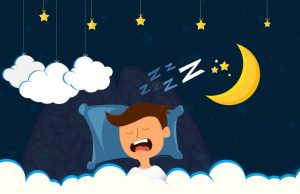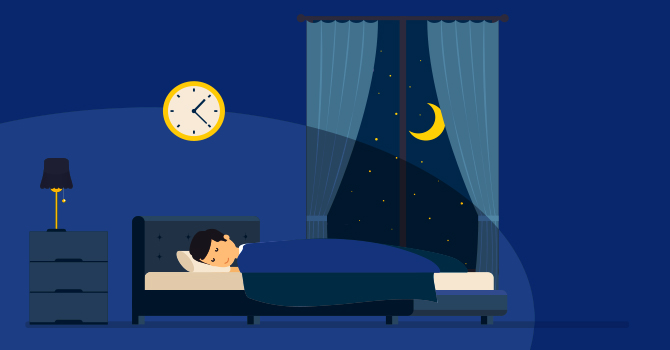In this article you will read:
- sleep disorder
- Cause of sleep disturbance
- Symptoms of sleep disorders
- What are the types of sleep disorders?
- How to diagnose sleep disorder
- How to treat sleep disorders
sleep disorder
Sleep disorder, as a mental disorder, causes a change in a person's sleep and rest patterns. This disorder may be accompanied by problems such as difficulty falling asleep, frequent awakenings during the night, or not deep and unpleasant sleep. People with sleep disorders may not have proper and complete sleep, as a result of which they feel tired, uncomfortable, lose concentration and increase the risk of other mental and physical problems during the day.
If you have a sleep disorder. Sleep disorder can have a serious impact on your health and quality of life. Here are some tips to help you solve your sleep problem:
- Regular sleep routine: try to go to sleep and wake up at a certain time every night. Stick to the same routine even on holidays.
- Creating the right environment for sleep: Make sure you prepare your bedroom for the right sleep. Ensure dark corners, low noises, and the right temperature (usually around 18-20 degrees Celsius). Also, using a bed and comfortable clothes can help you sleep. If possible, open the window a little, especially in spring and summer.
- Avoiding stimulants: Substances such as coffee, nicotine, fruit and alcohol can affect your sleep. Try to avoid consuming them in the hours before sleep.
- Regular physical activity: Regular physical activity during the day can help regulate your sleep time. Reduce daily stress by doing proper exercise, such as walking or yoga, and exercise three hours before bedtime.
- Ways to dress up before bed: Allow time to relax. Before bed, you can take a warm bath, read a book you like, or do heat breathing exercises to help your body fall asleep.
If your sleep problems persist for more than a few weeks and affect your daily functioning, it is better to consult a health professional to diagnose the cause of your sleep disorder and prescribe the appropriate treatment.
Cause of sleep disturbance
The cause of sleep disorder can be widely varied and varies depending on individual conditions. Some of the causes of sleep disorders are:
- Stress and anxiety: worries, daily problems, adverse life situations and anxiety can cause sleep disturbances.
- Diseases and physical problems: Some diseases such as pain, arthritis, heart, respiratory and nervous diseases may make it difficult to sleep well.
- Use of drugs and alcohol: The use of alcohol, drugs and addictive drugs may be among the factors that lead to unfavorable sleep and its disturbance.
- Nervous and mental disorders: Some mental disorders such as depression, anxiety symptoms, personality disorders and occupational stress disorder can affect sleep.
- Biological and environmental factors: Factors such as excessive light, noise, temperature, comfort of bed and clothing or sleeping items may affect sleep.
Accurate diagnosis of the cause of sleep disorder requires expert consultation and examination by a specialist doctor. If you have a chronic sleep problem, it is better to go to a doctor to guide you and perform the necessary tests so that the exact cause of your sleep problem can be determined and you can receive the appropriate treatment.
Symptoms of sleep disorders
The symptoms of sleep disorders may be diverse and depend on the type of disorder, its severity and the personality of each person. But some general symptoms of sleep disorders are:
- Difficulty falling asleep at first: You may have difficulty falling asleep, take a long time to fall asleep, or wake up frequently during the night.
- Restless sleep: If you have restless sleep and wake up several times during the night or have very light sleep, this can be a sign of a sleep disorder.
- Daily tiredness and sleepiness: If you feel constantly tired and sleepy when you wake up, this may be a sign of a sleep disorder.
- Waking up early in the morning: If you wake up too early in the morning and can't get back to sleep, there may be a problem with your sleep pattern.
- Feeling sleepy during the day: If you constantly feel sleepy during the day and can't stay awake, this could be a sign of a sleep disorder.
- Decreased concentration and efficiency: Sleep problems can lead to decreased concentration, poor memory, and decreased efficiency in everyday life.
- Changes in mood: Sleep disturbance can lead to mood changes, irritability, anger and depression.
Anyway, to be sure and get an accurate diagnosis, it is better to see a health professional so that she can diagnose the cause of your sleep disorder and prescribe the right treatment.
What are the types of sleep disorders?
There are many different types of sleep disorders. Below are some of the most common sleep disorders:
- Insomnia: In this disorder, a person has a problem in the initial sleep process, maintaining sleep or deep sleep. In general, insomnia can occur in two ways, usually end food (entertainment, change of sleep and wake time) and intuitive disorder (anxiety, stress, depression).
- Hypersomnia: People with hypersomnia may have a tendency to sleep a lot and feel sleepy and tired when they wake up.
- Hypnopompic/Hypnagogic hallucinations: In this disorder, a person experiences suggestive or fearful states in waking or initial sleep that can be related to dreams and unreality.
- Irregular sleep-wake rhythm: In this disorder, the person's sleeping and waking pattern is irregular and the person can sleep and wake up sporadically during 24 hours.
- Sleep apnea: In this disorder, frequent stops in breathing occur during sleep, which can be accompanied by frequent awakenings and sleep riots.
- Narcolepsy: Narcolepsy is a characteristic that involves the unexpected onset of deep sleep or sleep patterns during the day.
- Parasomnia: These disorders include any unconscious or normal sleep activity that can include jumping, sleepwalking, sleepwalking, and other simulated states.
These are just a few examples of disorders that may occur in sleep. Every sleep disorder should be treated by a specialist and the treatment will be different in each case based on the type and severity of the disorder.


Dr. Mohammad Eslami, clinical psychologist
PhD in psychology from a prestigious European university
Psychosomatic diseases fellowship
Licensed by Iran’s psychology system
Member of the Iranian Psychological Association
How to diagnose sleep disorder
Diagnosis of sleep disorder always requires consultation and balance between medical history, sleep records and diagnostic tests. First of all, it is better to see a specialist in sleep therapy so that he can make an accurate and appropriate diagnosis for your sleep disorder.
A medical doctor can reach a final diagnosis by performing the following steps:
- Interview: During this step, your doctor will review your medical history, including addictions, chronic illnesses, medications, mental status, and other possible factors that could affect your sleep.
- Sleep assessment: This stage includes measuring the quality and quantity of your sleep, including the time you wake up, the pattern of awakening during the night, the time it takes to fall asleep, and the amount of sleep.
- Sleep documentation: To more accurately assess sleep patterns and problems, you may be asked to provide a daily sleep log, in which you describe your sleep stages in detail.
- Sleep lab: In some cases, your doctor may refer you to a sleep center to monitor your sleep and physical activity electronically. This test can help make a more definitive diagnosis.
- Other tests: In some cases, your doctor may refer you for several tests, such as blood tests and other diagnostic tests.
After the sleep disorder is diagnosed, the treatment that is recommended depends on the type and severity of the disorder. Treatments may include changes in sleep patterns, medications, dietary guidelines, and lifestyle changes. Also, if the sleep disorder is aggravated by physical or psychological causes, the health professional may suggest to see another specialist as well.
How to treat sleep disorders
The treatment of sleep disorders will be different based on the type and severity of the disorder. In the following, I will mention some common treatment methods for sleep disorders:
- Change in sleep routine: It is better to persevere in the pattern of sleeping and waking in a fixed period of time every day. Avoiding long daytime naps and limiting coffee, nicotine, and alcohol before bed may improve your sleep patterns.
- Exercise techniques: Relaxing breathing techniques and meditation can help reduce stress and anxiety and speed up the restoration of the sleep process.
- Psychological treatment: If your sleep disorder is related to psychological problems, psychological treatment can be helpful. This includes methods such as sleep retraining, cognitive-behavioral therapy, and dream analysis.
- Medications: Your doctor may prescribe appropriate sleep medications. These drugs include anti-anxiety drugs, sleeping pills, and other special drug classes. Also, if there is a concomitant disease, attention will be paid to the treatment of the main disease.
- Eliminating environmental factors: creating a favorable sleeping environment by using things such as darkness, silence, coolness, and the comfort of the bed can accelerate the improvement of the sleep process.
However, before any treatment, it is recommended to consult with a specialist in sleep therapy so that you can get a reliable and accurate diagnosis for your sleep disorder and have a suitable treatment plan that is compatible with your condition.


